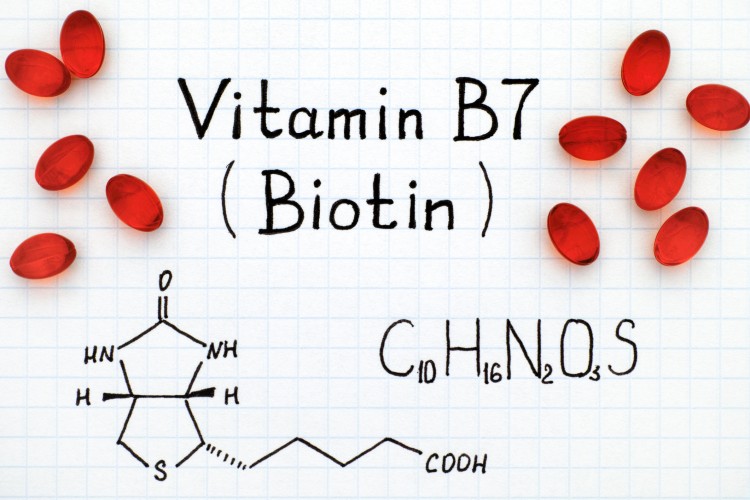Biotin Concern asked
What is the safe daily dosage for biotin? I have taken 5,000 mcg and 10,000 mcg. I assume that is way too much or is it okay since biotin is water soluble?
Answer
 Biotin, also known vitamin B7, Coenzyme R and vitamin H, is a essential water-soluble B vitamin. The term "essential vitamin" means that our bodies do not synthesize it at all, or in sufficient quantities. It must therefore be taken in from the food we consume.
Biotin, also known vitamin B7, Coenzyme R and vitamin H, is a essential water-soluble B vitamin. The term "essential vitamin" means that our bodies do not synthesize it at all, or in sufficient quantities. It must therefore be taken in from the food we consume.
The recommended daily intake of Biotin is set by The Department of Agriculture at 30 micrograms (0.03 mg) per day. For most individuals, supplementation is not necessary to avoid deficiency as biotin is found in most commonly eaten foods such as:
- Almonds
- Eggs
- Beef
- Pork
- Salmon
- Sweet potatoes
- Sunflower seeds
However, biotin supplementation in large doses, sometimes over 50 times the recommended daily intake, is very popular to support hair, nail and skin growth. While evidence is mixed regarding just how well biotin works in this regard, studies show that biotin is extremely safe, even in large doses, and is unlikely to cause serious adverse events.
High Doses Of Biotin And Safety
Biotin is a water-soluble vitamin and excess amounts are eliminated through the urine. While vitamins that are "water-soluble" generally are difficult to "overdose", they aren't without potential side effects. For example, "mega doses" of Vitamin C, another water-soluble vitamin, has been known to increase the risk of kidney stones and cramping.
Nevertheless, biotin doesn't not have documented cases of overdose and appears very well tolerated. While the daily recommended intake of biotin is only 30 micrograms, it is used in much higher quantities as a supplement. Studies have used doses ranging from 2,500 micrograms (2.5 milligrams) all the way to to 10,000 micrograms (10 milligrams) will no adverse effects.
In fact, toxicity studies with biotin have shown that:
- Ingestion of doses of biotin over 300 times the recommended intake does not produce signs of toxicity.
- Other studies have reported that there were likewise no signs of toxicity of overdose in those receiving doses, both orally and intravenously, over 600 times the recommended daily intake.
While there have been some anecdotal reports that biotin can alter the release of insulin and cause high blood sugar levels, but this doesn't appear to be the case. Evidence actually supports the opposite, that biotin can lower total blood glucose levels.
What most likely is taking place in anecdotal reports of side effects is that biotin is interfering with lab results. Although biotin appears very safe to take as a supplement, it is well known that it can affect a variety of laboratory blood tests, as discussed in the next section.
High Biotin Doses And Lab Tests
Studies show that biotin supplementation, at low doses (~30 micrograms), is unlikely to affect lab tests. However, large doses have definitively been shown to affect many different tests. The evidence is overwhelming and the FDA recently released a safety memo regarding the potentially serious matter. From the FDA memo:
"Biotin in patient samples can cause falsely high or falsely low results, depending on the test. Incorrect test results may lead to inappropriate patient management or misdiagnosis. For example, a falsely low result for troponin, a clinically important biomarker to aid in the diagnosis of heart attacks, may lead to a missed diagnosis and potentially serious clinical implications. The FDA has received a report that one patient taking high levels of biotin died following falsely low troponin test results when a troponin test known to have biotin interference was used."
It can be difficult to determine whether biotin may affect a certain lab tests and to what extent:
- Not all tests are affected by biotin, and there can be variability within similar tests, depending on the manufacturer.
- Biotin has been known to cause both falsely high (by blocking assay signals) and falsely low (by competing with biotin-containing complexes) test results.
Biotin has been reported to interfere with some of the following lab tests:
- Beta human chorionic gonadotropin (beta–hCG)
- Cortisol
- Estradiol
- Vitamin B12
- Thyroid Stimulating Hormone
- Thyroxine
- Progesterone
- Insulin
- Troponin
Studies suggest that it may be prudent to avoid biotin supplementation for at least 3 days prior to lab testing to reduce the risk of biotin affecting the results.
Summary
- Biotin, also known as Vitamin B7, is well tolerated in a range of dosages.
- Biotin is unlikely to cause adverse events, even when taken in high dosages.
- There are no documented cases of biotin overdose and toxicity studies have shown doses up to 600 times the recommended daily intake do not cause signs of toxicity.
- Biotin supplementation, at high doses, may interfere with a variety of lab tests.




